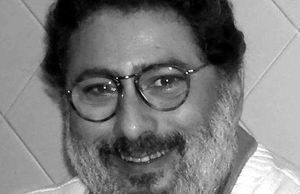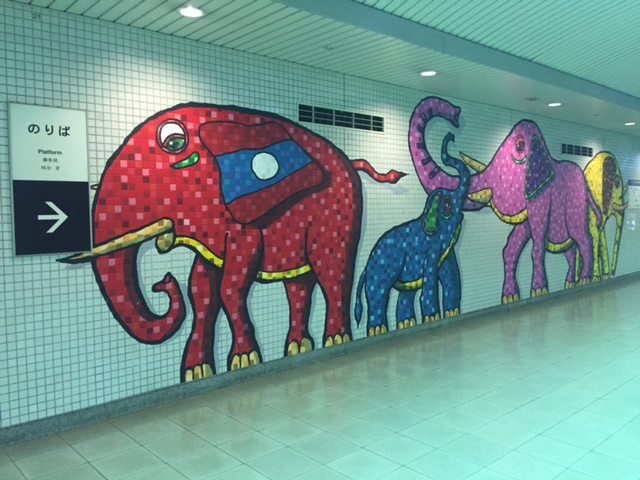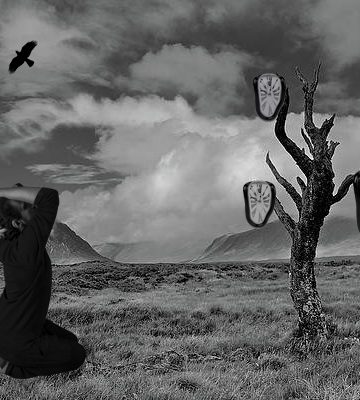by Julio Cesar Monteiro Martins, translated from the Portuguese by Debra Knauff.
THE POSITION
My friend Pedro died upside down, like a chicken or a piece of ripe fruit.
His feet were tied with a thick rope that hung from a hook in the ceiling. His hands were bound and almost touched the floor.
Pedro was naked, and his long, noble body looked like a statue from a demolished building.
Over and over Pedro swung like a pendulum, ticking off his own seconds of agony.
His face was red.
His feet were red.
The pain started in his legs and dripped down his spine to his head, like water.
The floor kept getting closer and closer every time one bone pulled away from another.
While he was hanging there, Pedro could only think
that it was a good thing I wasn’t with him when it all happened.
that there was a law of gravity.
that maybe it was the only law.
that he needed an ambulance and a doctor.
that it would cost him.
that he would make all the papers the next day.
that he wouldn’t make any paper.
that he’d like to be a rubber band.
that he’d like to not be.
that maybe he wasn’t anymore.
that he’d been in that position for months.
that maybe somebody would paint it or write it all down.
that it was raining outside.
that it doesn’t do any good to dam up rivers if you can’t stop the rain.
Those were the thoughts that ran together in Pedro’s mind, like cars in a huge traffic jam. But Pedro didn’t know
that his mother had died the night before.
that it was hot and sunny outside.
that he’d been in that position for a little over twelve hours.
that he’d never leave that position alive.
that nobody knew where he was.
that, deep down, everybody knew where he was.
that his feet were already rotten because of the lack of circulation.
that his cock was erect, from the concentration of blood.
that it was the day of the final game of the Championship.
that everyone was pulling for his team.
that I would write this story.
that he stunk like a wild pig.
that one of his eyes had popped out of his socket.
that it would just be “suicide”.
that his blood would go through the same miracle as the loaves.
Someone suggested that they tie a parallelepiped to Pedro’s head. A parallelepiped in a granite block. Granite is a material whose density is different from the material that was hanging. And someone else thought of dousing him with water so he’d wake up. Water, of the opposite density compared to granite, was advised because of its more agreeable temperature. And then another one warned them that the guy was dying, and that there was nothing to gain if he died. More than anything, I know least about death’s density, temperature or volume.
Pedro had stopped listening to the voices half an hour before that. The thick saliva that was dripping from his mouth fell to the roots of his hair.
His face was purple.
His feet were purple.
The men realized then that he really was dying. One of them climbed a ladder, holding Pedro’s body around the waist, and flipped him over quickly to a normal position.
That was when my friend Pedro’s head exploded like a bomb.
Or
it was when my friend Pedro summoned his final strength to spit right into that blank face staring at him.
Or
it was the time that was left, so my friend Pedro could ask anyone who could hear his weak voice : “Don’t any of you have children ?”
Or
it was when his brain oozed blood together with one last silent idea, that whether he alone died or all of them died, everything would go on being so relative.
Or
it was when he felt a perceptible improvement, and shut up. Not knowing that half his body had already rotted. Nor even imagining all the insects quietly lying in wait.
Or
it was when he could tell he’d been untied, and urging the last bits of life in his hands to his own neck, finished the service that the men had left undone. That’s how Pedro was, used to competence. Pedro was like that : he never left anything unfinished.
And he didn’t leave anything unfinished, because time finishes everything off.
Even the kind of time that dies upside down, like a chicken or a piece of ripe fruit.
Rio de Janeiro, Summer of 1976.

Júlio Cesar Monteiro Martins was born in Niterói, in the Greater Rio, in 1955 and died in Pisa in 2014. His Portuguese literary production includes several short-story books: Torpalium, Sabe Quem Dançou?, A Oeste de Nada, As Forças Desarmadas, and Muamba. Monteiro Martins is also the author of three novels: Artérias e Becos, Bárbara, O Espaço Imaginário and a volume of essays: O Livro das Diretas. He was one of the founders of the Brazilian Green Party and from 1992 to 1994 worked as a lawyer for the Brazilian Center in Defense of Children’s Rights. He taught creative writing at the Goddard College in the US and was a professor in Italy, teaching literary creation and Brazilian literature at the University of Pisa. His Italian language literary production (under the name of Julio Monteiro Martins) is extensive and includes short story collections, novels and poetry. Among his most important works: “Racconti italiani” (2000), “La passione del vuoto” (2003), “madrelingua” (2005), “L’amore scritto (2007), the poetry collection “La grazia di casa mia” (2013) and the posthumous book “La macchina sognante” (2015). He was the founder and director of the online international literature quarterly “Sagarana”, which he directed uninterruptedly from 2000 to 2014.





















































